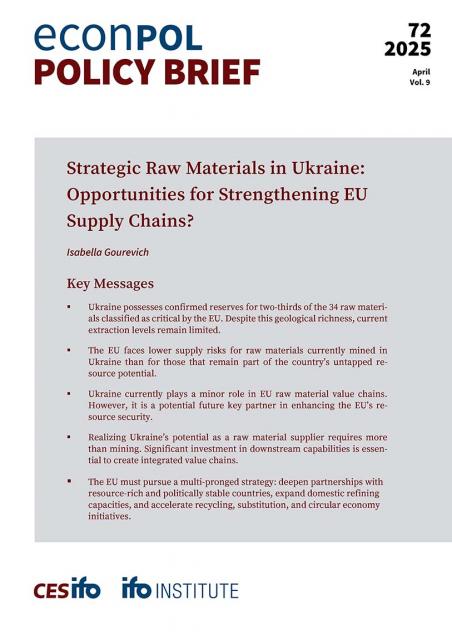Adaptation to Climate Change
EconPol Annual Conference 2025
-
Representation of the Free State of Bavaria to the EU, Rue Wiertz 77, Brussels
Please Register Here
Participation is free of charge, but registration is required. Please be advised that you will be redirected to the online registration platform of Oxford Abstract, where you need to create an account in order to register for this event.
Climate policy debates tend to focus on reducing greenhouse gas emissions, the primary cause of climate change. However, climate change is expected to continue even under the most optimistic emission scenarios, inflicting severe damage. Across Europe, increasingly frequent and more severe flooding is causing significant physical damage, while rising temperatures and droughts are leading to severe economic losses for farmers in Europe and around the world. Climate change also threatens the livelihoods of communities in many developing countries, where resilience is already low. Therefore, it is crucial to develop comprehensive adaptation strategies to minimize economic costs, enhance public safety, and address health threats associated with the escalating climate crisis. Yet, adaptation to climate change poses many challenges for policymakers, businesses, and households, due to uncertainty about the extent of climate change, a lack of information on effective adaptation measures, high implementation costs, and long time frames that are difficult to navigate.
In our first panel, experts from politics, research, and the private sector will discuss the role of politics in fostering a climate-resilient national or EU economy. How can public funds be allocated to encourage innovation, provide information, and coordinate localized efforts to maximize synergies and avoid unnecessary costs? How can politics set the right incentives for companies and households to engage in efficient private adaptation?
Next, we will look beyond Europe to examine the barriers to adaptation faced by developing countries, assess whether the EU development strategy effectively helps overcome these barriers, and explore whether opportunities for adaptation exist.
Finally, it is likely that migration will respond to climate change. What challenges does this pose for both developing and developed countries? We will investigate the economic benefits of migration for both host countries and migrants, as well as the prerequisites for the successful integration of migrants into destination countries.
Join us at our 2025 Annual EconPol conference as we shed light on some of the most complex and most pressing questions of our time that put adaptation and resilience to climate change center stage.

![]()
- Preliminary -
11.30 a.m. Registration
12.00 a.m. Light Lunch
13.00 p.m. Welcome
Armin HARTHMUTH (Head of the Representation of the Free State of Bavaria to the EU)
13.05 p.m. Introduction
Clemens FUEST (President – ifo Institute & CESifo, EconPol Europe)
13.15 p.m. Keynote Speech: Adaptation to Climate Change
Kurt VANDENBERGHE (Director-General DG Clima, European Commission)
13.30 p.m. PANEL A: EU Adaptation Strategy and National Adaptation Strategies - Building a Climate-Resilient European Union
In this panel we will discuss the role of policy in promoting a climate-resilient national and EU economy. How can public funds be used to promote innovation? Where can appropriate data on climate change be made available? How can local efforts be coordinated to avoid unnecessary costs? How can policymakers set the right incentives for companies and private households to adapt to changes efficiently and responsibly?
Panelists:
Blaz KURNIK (Head of Climate Change Impacts and Adaptation, European Environment Agency)
Karen PITTEL (Director - ifo Center for Energy, Climate, and Ressources, ifo Institute & LMU Munich; CESifo Fellow)
Frederick VAN DER PLOEG (Professor of Economics, University of Oxford & Research Director Oxford Centre for Analysis of Resource Rich Economies)
14.15 p.m. Coffee Break
14.45 p.m. PANEL B: Adaptation to Climate Change in Developing Countries
In this panel, we will link the European perspective with the perspective of developing countries, as the latter are particularly hard hit by the consequences of climate change. What adaptation strategies are available to these countries? What obstacles do these regions have to overcome if they want to adapt? Does the EU development strategy contribute effectively to overcoming these obstacles?
Panelists:
Andrei MARCU (European Roundtable on Climate Change & Sustainable Transition)
Johan SWINNEN (Director General International Food Policy Research Institute)
Maria WALDINGER (Deputy Director - ifo Center for Labor and Demographic Economics, ifo Institute & LMU Munich; CESifo Fellow)
15.30 p.m. Coffee Break
16.00 p.m. PANEL C: Migration - And Adaptation Strategy with Political Implications
In this panel, we examine migration as an adaptation strategy to climate change. It has considerable consequences - for both developing and industrialized countries. What economic benefits does migration offer host countries? How can migrants benefit? What conditions need to be created to integrate migrants in destination countries?
Panelists:
Ibrahima Amadou DIA (Director - African Centre for the Study and Research on Migration, African Union)
Orlane Mathieu MAINCENT (Humanitarian Programme Development, Migration & Climate Change/Disaster - IOM, UN Migration)
Panu POUTVAARA (Director - ifo Center for Migration and Development Economics, ifo Institute & LMU Munich; CESifo Fellow)
... and other high-level panelists from business, politics, NGO and academia to be confirmed.
16.45 p.m. Concluding Remarks
